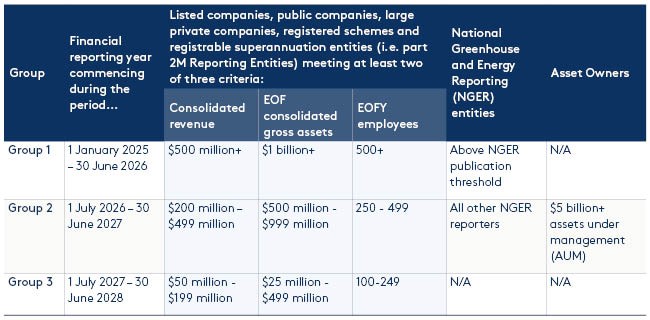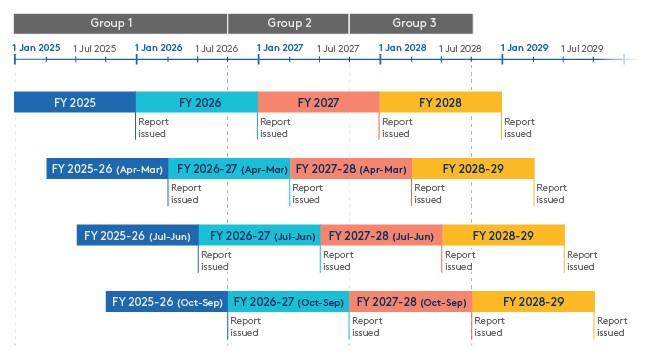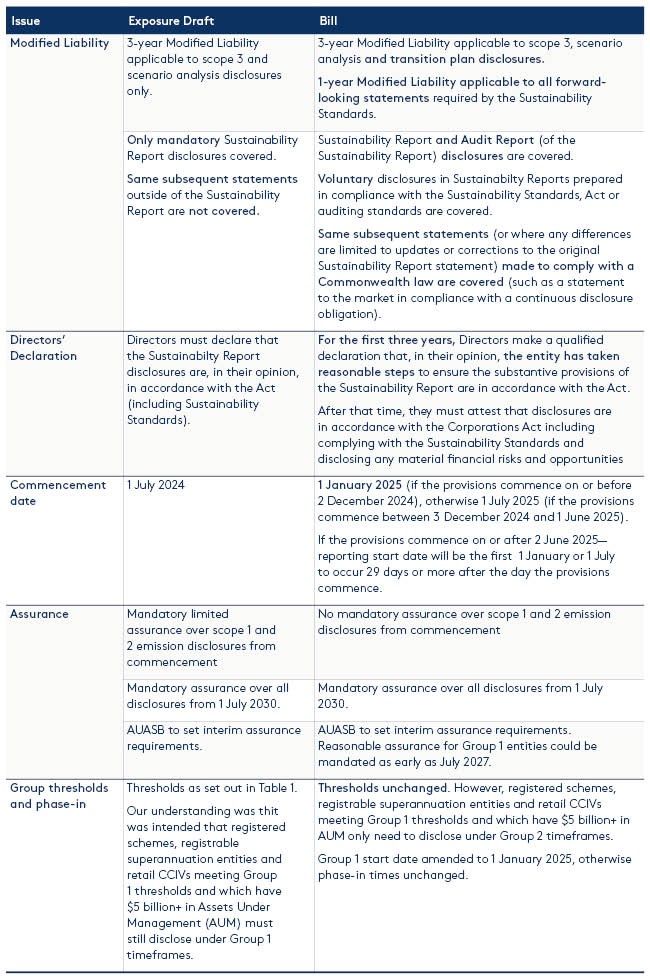Following extensive consultation, on 27 March 2024 the Government introduced its mandatory climate reporting bill into Parliament (Bill), with the regime proposed to commence from 1 January 2025. Responding to AICD and other stakeholder concerns, the Bill includes significantly strengthened three-year modified liability and directors’ declaration provisions.
Summary:
- The Bill retains a phased approach to disclosure, starting with the largest emitters, companies and financial institutions reporting from the financial year commencing 1 January 2025. Group 2 entities will commence reporting from 1 July 2026 and Group 3 entities from 1 July 2027.
- The Bill provides for a three-year modified liability period of regulator-only enforcement. In the first year of the regime, all forward-looking climate disclosures made for the purpose of compliance with a Sustainability Standard or auditing standard will be covered, while scope 3, scenario analysis and transition planning disclosures will be covered for the first three
- Modified liability will also apply to subsequent publication of the same statements and/or statements where any differences are limited to updates or corrections to the original Sustainability Report, made to comply with a Commonwealth law (e.g. continuous disclosure).
- The Bill also provides for a qualified directors’ declaration for the first three years of the regime, such that directors must confirm “whether, in the directors’ opinion, the entity has taken reasonable steps” to ensure compliance. After that period, the sign-off will require attestation that reporting complies with the Corporations Act.
- Throughout consultations, AICD has been a strong advocate for modified liability settings and the need for a qualified director sign-off. We consider the approach in the Bill strikes a sensible balance and will help encourage more fulsome disclosures in particularly uncertain areas.
What is the Government proposing?
The Government’s proposal, as set out in the Draft Legislation issued for consultation on 12 January 2024, is summarised in this article, and also below:
- WHO must report and WHEN: A three-tiered approach is proposed based on organisational size (see table 1 below), with Group 1 entities reporting from the reporting period commencing 1 January 2025 (or 1 July 2025 if the Bill does not commence by 2 December 2024). Charities are excluded, but Not-for-Profit (NFP) organisations that meet the relevant thresholds are covered. However, it is proposed that only those Group 3 entities facing material climate-related risks or opportunities are required to disclose under the regime. Those Group 3 entities that conclude they have no material climate-related risks or opportunities must make a statement to this effect, and must explain their rationale for coming to this conclusion (a Directors’ Declaration is still required).

Table 1: Group thresholds and phase-in times
- WHERE will the disclosures be set out? Disclosures are to be made annually in a separate Sustainability Report which sits within the Annual Report (the other ‘parts’ of the Annual Report being the Financial Report, Directors’ Report and Audit Report).
- WHAT DISCLOSURES will be required: Entities must disclose under the Australian Sustainability Reporting Standards (Sustainability Standards), which are an Australian adaptation of the International Sustainability Standards Board (ISSB) standards still being developed by the Australian Accounting Standards Board (AASB).
Directors’ Declaration: Directors will be required to state whether, in their opinion, the disclosures are in accordance with the Corporations Act including complying with the Sustainability Standards and disclosing any material financial risks and opportunities. For the first three years of the regime, directors are only required to make aqualified Directors’ Declaration (Qualified Directors’ Declaration) whereby they affirm “whether, in the directors’ opinion, the entity has taken reasonable steps” to ensure the substantive provisions of the Sustainability Report comply with the Sustainability Standards and the Corporations Act.
- WHAT ASSURANCE will be required: Assurance over all climate disclosures will be mandatory from 1 July 2030, with the Auditing and Assurance Standards Board (AUASB) to set interim mandatory assurance requirements through the issue of auditing standards. The AUASB is currently consulting on the sustainability auditing standards and assurance timetable. Under those proposals, limited assurance of scope 1 and 2 emissions would be required for Group 1 entities with financial reporting periods commencing 1 January 2025 to 30 June 2025, and escalating to reasonable assurance over governance and scope 1 and 2 emissions and limited assurance over strategy (including risks and opportunities), qualitative scenario analysis, climate resilience assessments, transition plan and climate-related targets, risk management, scope 3 emissions and other metrics and targets for disclosures in the financial reporting periods commencing 1 July 2025 to 30 June 2026. Reasonable assurance is proposed over all Group 1 disclosures from July 2027.
- WHAT are the CONSEQUENCES OF NOT COMPLYING/ POOR COMPLIANCE? The failure to keep and retain sustainability records and make the Sustainability Report publicly available after lodgement with ASIC will attract civil penalties or even gaol time.
Modified Liability regime: It is proposed that a fixed three-year regulator-only enforcement period (Modified liability) will apply, such that private litigation will be barred and only ASIC can bring civil proceedings for reporting in financial years commencing during the period 1 January 2025 to 31 December 2027.
The Modified Liability will apply to the following ‘Protected Statements’:
- all forward-looking climate disclosures made for the purpose of compliance with a Sustainability Standard or auditing standard for the first year of the regime (i.e. will apply to Group 1 entities only); and
- scope 3, scenario analysis and transition planning disclosures for the first three years of the regime’s operation.
Additionally, the Modified Liability will apply to:
- voluntary disclosures in Sustainability Reports, provided they are made in compliance with the Sustainability Standards, the Act or auditing standards; and
- a subsequent statement that is the same as the Protected Statement (or where any differences are limited to updates or corrections to the original Sustainability Report statement) which is made to comply with a Commonwealth law. This should cover continuous disclosure updates.
How will the Modified Liability and Qualified Directors Declaration work across the Groups?
The Bill’s Explanatory Memorandum states that the most common legal actions likely to be affected by Modified Liability are civil proceedings for misleading or deceptive conduct, although alleged breaches of directors’ duties and other actions such as negligent misstatement, breach of statutory duty and breach of fiduciary duties will all be covered. The Explanatory Memorandum states that the “policy intention is to ensure that during the transitional period, ASIC can undertake a role that promotes education about compliance with the new reporting regime and deter poor behaviours and reporting practices that are contrary to the objectives of the new reporting regime.”
In apparent recognition of the unique challenge facing Group 1 entities reporting in the first year of the new regime, Modified Liability will apply to all forward-looking representations made by that cohort. It will not apply more broadly.
Figure 1 provides an illustrative example of how the three-year Modified Liability (scope 3, scenario analysis and transition plan disclosures) and Qualified Directors’ Declaration are expected to apply to different Groups, with those in blue, green and orange to receive protection on the basis of a 1 January 2025 commencement date. Those in yellow stripes will not be subject to the Modified Liability or Qualified Director Declaration.
Our understanding is that all Group 1 entities (regardless of financial year balance dates) will have the benefit of the 3-year Modified Liability and Qualified Director Declaration period, with most Group 2 entities benefiting for two years, and most Group 3 entities for one year only. The situation appears complicated for March year-end companies, as Group 2 reporting obligations commence on 1 July 2026, and Group 3 from 1 July 2027, whereas the relief period is expressed as a financial year commencing during the 3 years starting on the start date (proposed to be 1 January 2025).

Figure 1 : Illustrative example of the application of the Modified Liability and Qualified Directors' Declaration
What are the key changes from the Exposure Draft Legislation?
The Government issued Exposure Draft Legislation for consultation on 12 January 2024 (Exposure Draft, see this article). Table 2 below sets out the key differences between the Exposure Draft and the Bill that has been introduced to Parliament.
Table 2: Key differences between Exposure Draft and Bill

What happens next?
The Bill has been referred to the Senate Economics Legislation Committee for inquiry and report by 30 April 2024.
The wording of the Bill is such that for the 1 January 2025 implementation date to apply, the Bill needs to have been passed by both houses and to have commenced by 2 December 2024.
In parallel, the AASB needs to issue its final Sustainability Standards, following the recent conclusion of its consultation (see the AICD view on the Draft Sustainability Standards here).
The AUASB is currently consulting on the Sustainability Auditing Standards (consultation closes 3 May 2024), including what interim assurance requirements should be imposed (noting full assurance over all disclosures is required under the Bill from 1 July 2030).
The Bill’s Explanatory Memorandum confirms that that “the Government is taking a ‘climate first, but not only’ approach to mandatory disclosure requirements,” meaning that further sustainability-related areas are likely to come into scope for future reporting (this is also the approach set out in the Government’s draft Sustainable Finance Strategy – see this AICD article).
For practical steps that directors can take to prepare for the introduction of mandatory climate reporting, including key questions to ask of management, see the Climate Governance Imitative (CGI) Australia’s Director’s Guide to Mandatory Climate Reporting. While we will update the Guide to reflect the Bill, the Guide’s core recommendations remain relevant.
Latest news
Already a member?
Login to view this content


